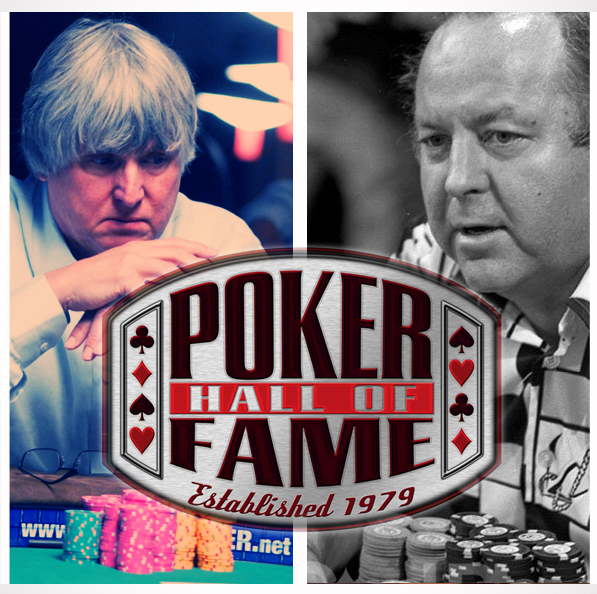The Governing Council of the Poker Hall of Fame has announced the hall’s Class of 2012: Brian “Sailor” Roberts and Eric Drache.
Brian “Sailor” Roberts was one of the players in attendance when the World Series of Poker began in 1970, and he would go on to win two gold bracelets: one for the $5,00 0 No Limit Deuce to Seven Draw event in 1974, and the other for the Main Event in 1975. But his legend goes back 20 years further, to his time as one of the original Texas Rounders. In partnership with Doyle Brunson and “Amarillo Slim” Preston, Sailor traveled across Texas playing in underground games and, as the old saw goes, earning an easy living the hard way. As fellow Texan and Hall of Famer Crandell Addington noted, “At a time in which professional poker players were viewed as outlaws and poker was illegal, he formed a partnership with Doyle and Slim and they traveled across the country from poker game to poker game. They deployed advanced strategies unknown at the time that featured playing their opponents hands on many occasions rather than their own hands. More often than not, they got the money.”
0 No Limit Deuce to Seven Draw event in 1974, and the other for the Main Event in 1975. But his legend goes back 20 years further, to his time as one of the original Texas Rounders. In partnership with Doyle Brunson and “Amarillo Slim” Preston, Sailor traveled across Texas playing in underground games and, as the old saw goes, earning an easy living the hard way. As fellow Texan and Hall of Famer Crandell Addington noted, “At a time in which professional poker players were viewed as outlaws and poker was illegal, he formed a partnership with Doyle and Slim and they traveled across the country from poker game to poker game. They deployed advanced strategies unknown at the time that featured playing their opponents hands on many occasions rather than their own hands. More often than not, they got the money.”
Eric Drache became the first tournament director of the World Series of Poker in 1973. He helped to guide the fledgling tournament series toward expansive growth through the introduction of side events and, most importantly, the invention of the satellite tournament, which allowed players to earn their entry into big tournaments for a fraction of the cost. Those innovations and others set the stage for the poker boom that arrived in the early 21st century thanks to televised coverage of major poker tournaments. And once TV was in play, Drache got involved with it as well, serving as a producer and consultant for numerous high-profile shows including Poker Superstars, NBC National Heads-Up Championship, and High Stakes Poker. Drache still enjoys a reputation as a world-class seven-card stud player, too, having finished second in the WSOP’s biggest stud event on three different occasions spanning four decades. He always played top competition, resulting in the old line about him going something like this: “Eric Drache is the seventh-best stud player in the world but insists on playing against the top six.”
Given the makeup of this year’s field of nominees, which included several of the biggest tournament money-winners of all time, the selections come as at least a mild shock. The Poker Hall of Fame has sometimes favored high-profile tournament achievements over other contributions to the game. This year’s honorees – one who has spent most of his long career in the game behind the scenes, the other an old road gambler who passed away 17 years ago – are the very antithesis of flash. In fact, they can be seen as the embodiment of the Hall’s vaguest criterion for induction: “the test of time.”
Stories of Roberts and his fellow Texas road gamblers have become one of the touchstones of poker’s romanticized past and, in this era where some an amateur can win two bracelets and never be heard from again, are much more present in the community’s collective consciousness than his achievements at the tables. As for Drache’s major contributions to poker, while they made several decades’ worth of growth in the game possible they seemed like they could be easy to overlook in favor of players who have piled up big statistics at the tables in the last two decades. To choose them over highly accomplished players like Scotty Nguyen and John Juanda is a nod to the notion that time reveals much about the worth of one’s accomplishments in this game. It’s also about family: both Drache and Roberts had ties to the earliest days of the WSOP, and Roberts, beloved by his fellow players, was the last of the old Texas road gambler trio not to have a place in the Hall.
The game of poker has always changed with the times, at no time more so than in the last two decades, when a handful of players have repeatedly demonstrated their prowess at the tables against top competition. The only reason poker was ever in a position to get where it is today, though, is because of people like Roberts and Drache. In choosing them, the Hall’s voters acknowledged that there are times when induction should be more about honoring those whose contributions aren’t as obvious as big money winners yet run deep enough to have an effect on the community at large. The other nominees remain eligible for future induction, and several of them will undoubtedly achieve it sometime down the road. But for this year, at least, the Poker Hall of Fame is looking back and paying homage to the earliest days of the game as we know it today.
